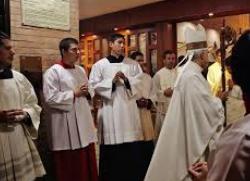 The Latin word caeremonia came to Spanish as a ceremony . It is the action that is carried out according to a custom , a regulation or a rule , with the objective of paying tribute or expressing respect or adherence to something or someone.
The Latin word caeremonia came to Spanish as a ceremony . It is the action that is carried out according to a custom , a regulation or a rule , with the objective of paying tribute or expressing respect or adherence to something or someone.
A ceremony can be linked to a ritual or a rite that is based on tradition . The act in question requires the completion of various formal steps that give it solemnity.
For example: "The opening ceremony of the Olympic Games was followed by millions of people through television and the Internet" , "After the religious ceremony, the couple will host a dinner for their friends and family at an exclusive restaurant in the central area» , «During the farewell ceremony there were numerous signs of pain» .
Human beings have been performing ceremonies for thousands of years. In their origins, the ceremonies were linked to communication with the gods : sacrifices were made, offerings were given, etc. The emergence of religions as institutions formalized this type of actions and thus sacraments and liturgies emerged.
Beyond religion , there are other types of ceremonies. Civil marriage , to cite one case, consists of a ceremony conducted by a state authority and that requires the members of the couple to comply with certain requirements (such as expressing their consent to the union and signing an act).
The celebration of a birthday, the inauguration of a public work, the commemoration of an anniversary and the celebration of a graduation are other events that involve the development of ceremonies.
Organizing a ceremony is not an easy task, especially when the volume of the event is considerable and has a commercial nature or cannot be repeated if the result is not the desired one. Among all the examples mentioned in the previous paragraphs, the wedding is probably the most frequently celebrated type of ceremony around the world, and the preparations can be really exhausting.
 The first point that comes to mind when we think about a wedding ceremony is the number of guests; Not only is it necessary to contact dozens of people with whom we have often not spoken for years, but we must group them at tables so that they can spend a pleasant evening and talk with their colleagues.
The first point that comes to mind when we think about a wedding ceremony is the number of guests; Not only is it necessary to contact dozens of people with whom we have often not spoken for years, but we must group them at tables so that they can spend a pleasant evening and talk with their colleagues.
Each ceremony can be different since its characteristics combine cultural issues, personal preferences and the characteristics of the time in which they are celebrated. For example, music comes into this context: weddings usually include a musical repertoire meticulously chosen by the bride and groom and this must cover both the songs that are performed at the time of the service (whether in a religious temple or in a building of government, among other possibilities) as well as in the reception that usually comes afterwards.
If the ceremony will have people of various nationalities as guests, who speak different languages, then it becomes necessary to plan each step taking into account that communication will be more complicated and that any mistake could result in some people feeling ignored and uncomfortable. For this reason, to avoid problems, the first thing is to print the invitations in all the necessary languages.
When the time of the ceremony comes, international guests will need multilingual staff or at least from their own country of origin to guide them and assist them with any questions. Food is another aspect that is partly related to the origin of the diners, since due to cultural or religious reasons not everyone will be able to eat the same thing, and this affects not only the menu but also the choice of suppliers and cooks. .
